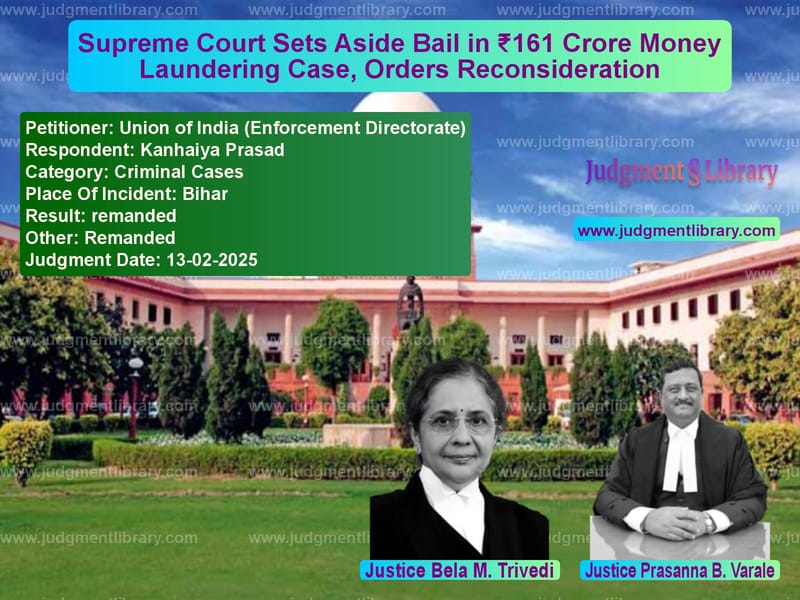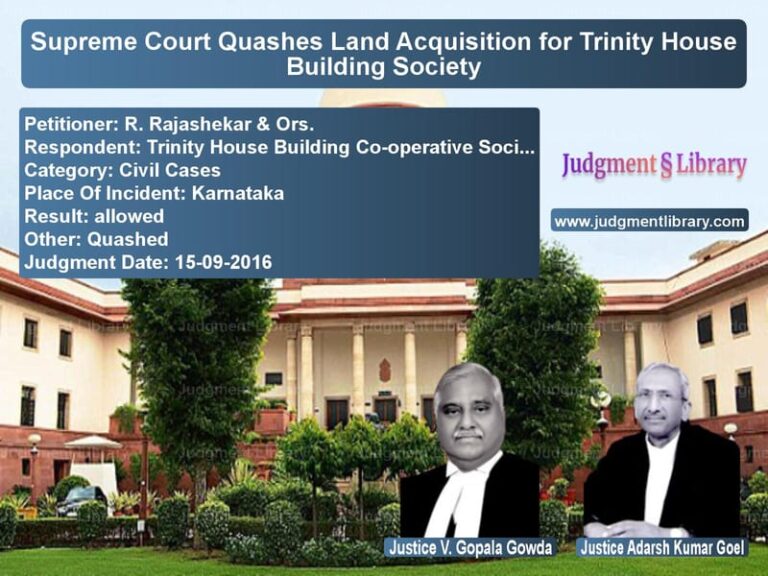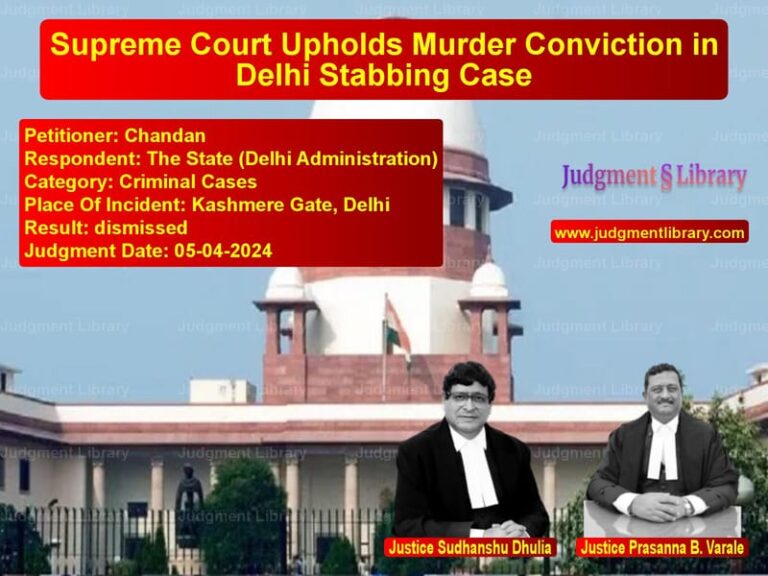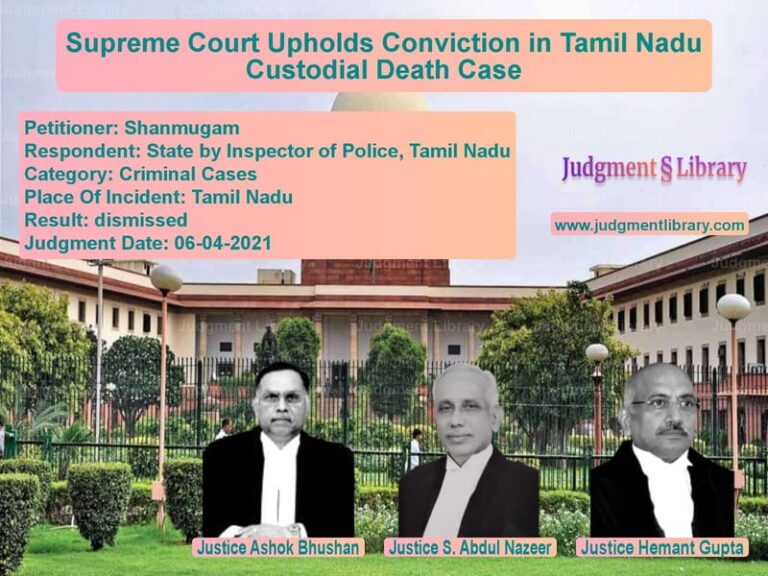Supreme Court Sets Aside Bail in ₹161 Crore Money Laundering Case, Orders Reconsideration
The Supreme Court of India, in the case of Union of India through the Enforcement Directorate v. Kanhaiya Prasad, set aside the Patna High Court’s order granting bail to the accused in a high-profile money laundering case. The Court directed a fresh review of the bail application while emphasizing that bail under the Prevention of Money Laundering Act (PMLA) must adhere to the stringent twin conditions under Section 45. The ruling serves as a precedent in ensuring financial crime cases are scrutinized rigorously before granting bail.
Background of the Case
The case pertains to an illegal sand mining operation in Bihar, where the accused, Kanhaiya Prasad, was allegedly involved in laundering proceeds of crime through shell companies. The Enforcement Directorate (ED) initiated an investigation following multiple FIRs registered against M/s Broad Son Commodities Private Ltd and its directors.
According to the ED:
- The company was accused of bypassing the government’s pre-paid transportation e-challan system, causing a ₹161.15 crore revenue loss to the exchequer.
- The accused was arrested on September 18, 2023, after ignoring multiple summonses.
- The ED uncovered transactions linked to 17.26 crore laundered through multiple entities.
- The funds were allegedly used for personal gains, including renovating a resort in Manali and constructing a school owned by the accused’s family.
Legal Proceedings
Special Court (PMLA)
The Special Court refused to grant bail, citing:
- The ED had prima facie evidence linking the accused to money laundering activities.
- The case involved a large-scale economic offense affecting public funds.
- The twin conditions of Section 45 of PMLA were not satisfied.
Patna High Court Ruling
The accused then approached the Patna High Court, which granted bail, reasoning:
- The trial had not commenced, and prolonged custody without formal charges was unjust.
- The accused had cooperated with investigations.
- There was no likelihood of tampering with evidence or influencing witnesses.
Arguments Before the Supreme Court
Petitioner’s Arguments (Enforcement Directorate)
- The High Court failed to apply the twin conditions of Section 45 of PMLA, which require the court to be satisfied that the accused is not guilty and will not commit an offense while on bail.
- The magnitude of the offense demanded a higher threshold for bail consideration.
- The accused had used shell companies to conceal and layer proceeds of crime, making the offense a grave economic crime.
- The statements recorded under Section 50 of PMLA were admissible and provided key evidence against the accused.
Respondent’s Arguments (Kanhaiya Prasad)
- The prosecution relied on statements obtained under coercion, violating Article 20(3) of the Constitution.
- He had no direct role in the primary offense and was being implicated based on financial transactions.
- His health conditions necessitated bail.
- The prosecution had not filed a charge sheet within the stipulated period, making continued detention unjust.
Supreme Court’s Observations
The Supreme Court ruled that the High Court had granted bail without satisfying the mandatory requirements under PMLA:
- “The High Court’s order granting bail is in the teeth of Section 45 of PMLA, which mandates strict conditions for economic offenses.”
- “The trial court’s detailed findings on the accused’s involvement were ignored by the High Court.”
- “Statements under Section 50 of PMLA are admissible and provide sufficient basis for continued investigation.”
- “The economic ramifications of money laundering require courts to exercise caution before granting bail.”
Final Judgment
The Supreme Court ruled:
- The Patna High Court’s bail order was set aside.
- The matter was remanded to the High Court for fresh consideration of the bail application.
- The accused was directed to surrender within one week.
Impact of the Judgment
- Reinforces Stringent Bail Conditions: The ruling upholds the strict standards for granting bail in money laundering cases.
- Ensures Thorough Judicial Review: Courts must assess the gravity of financial offenses before releasing the accused.
- Precedent for Economic Offenses: Strengthens enforcement of financial crime laws under PMLA.
Conclusion
The Supreme Court’s decision in Union of India v. Kanhaiya Prasad reinforces the integrity of financial crime laws, ensuring that accused individuals in money laundering cases are granted bail only after due diligence. By mandating a fresh review, the judgment upholds the legal framework designed to combat large-scale economic offenses.
Petitioner Name: Union of India (Enforcement Directorate).Respondent Name: Kanhaiya Prasad.Judgment By: Justice Bela M. Trivedi, Justice Prasanna B. Varale.Place Of Incident: Bihar.Judgment Date: 13-02-2025.
Don’t miss out on the full details! Download the complete judgment in PDF format below and gain valuable insights instantly!
Download Judgment: union-of-india-(enfo-vs-kanhaiya-prasad-supreme-court-of-india-judgment-dated-13-02-2025.pdf
Directly Download Judgment: Directly download this Judgment
See all petitions in Money Laundering Cases
See all petitions in Bail and Anticipatory Bail
See all petitions in Judgment by Bela M. Trivedi
See all petitions in Judgment by Prasanna Bhalachandra Varale
See all petitions in Remanded
See all petitions in Remanded
See all petitions in supreme court of India judgments February 2025
See all petitions in 2025 judgments
See all posts in Criminal Cases Category
See all allowed petitions in Criminal Cases Category
See all Dismissed petitions in Criminal Cases Category
See all partially allowed petitions in Criminal Cases Category







